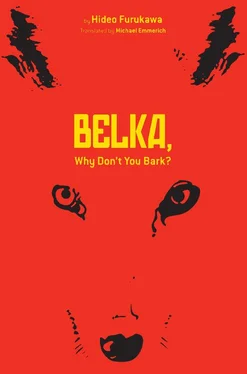Hideo Furukawa - Belka, Why Don't You Bark?
Здесь есть возможность читать онлайн «Hideo Furukawa - Belka, Why Don't You Bark?» весь текст электронной книги совершенно бесплатно (целиком полную версию без сокращений). В некоторых случаях можно слушать аудио, скачать через торрент в формате fb2 и присутствует краткое содержание. Город: San Francisco, Год выпуска: 2012, ISBN: 2012, Издательство: Haikasoru, Жанр: prose_magic, Современная проза, на английском языке. Описание произведения, (предисловие) а так же отзывы посетителей доступны на портале библиотеки ЛибКат.
- Название:Belka, Why Don't You Bark?
- Автор:
- Издательство:Haikasoru
- Жанр:
- Год:2012
- Город:San Francisco
- ISBN:978-1-4215-5089-3
- Рейтинг книги:4 / 5. Голосов: 1
-
Избранное:Добавить в избранное
- Отзывы:
-
Ваша оценка:
- 80
- 1
- 2
- 3
- 4
- 5
Belka, Why Don't You Bark?: краткое содержание, описание и аннотация
Предлагаем к чтению аннотацию, описание, краткое содержание или предисловие (зависит от того, что написал сам автор книги «Belka, Why Don't You Bark?»). Если вы не нашли необходимую информацию о книге — напишите в комментариях, мы постараемся отыскать её.
https://www.youtube.com/watch?v=ay_DcZ6RDFA https://www.youtube.com/watch?v=Orvqrqjk9pU
Belka, Why Don't You Bark? — читать онлайн бесплатно полную книгу (весь текст) целиком
Ниже представлен текст книги, разбитый по страницам. Система сохранения места последней прочитанной страницы, позволяет с удобством читать онлайн бесплатно книгу «Belka, Why Don't You Bark?», без необходимости каждый раз заново искать на чём Вы остановились. Поставьте закладку, и сможете в любой момент перейти на страницу, на которой закончили чтение.
Интервал:
Закладка:
I’LL MINGLE MY BLOOD WITH OTHERS! you proclaim.
I’LL MONGRELIZE MYSELF, AND THAT WILL MAKE ME STRONGER! I’LL BE THE STRONGEST DOG EVER! you determine, without the use of words. TO LIVE, TO LIVE, TO GO ON LIVING!
You pay no heed to established “breeds” created by humans. You pursue your own ideal. You had come face to face with the Absolute, there in the permafrost. A mammoth that had lain there, frozen, for more than ten thousand years. An enormous mammal, now extinct. And what of you, Anubis? You were a member of the canine tribe, which had appeared around the same time that mammoth died, more than ten thousand years ago. Half the blood in your veins was lupine; in that sense you had reverted to an earlier stage in your evolution. You were reliving your own evolution. You had been given a chance, once again, to press ahead toward what dogs were originally meant to be. You understood. And so you said: I WILL NOT BECOME EXTINCT.
Only dogs can guide canine evolution. You, Anubis, had that desire.
You were awake.
Here, in this vast territory, you were what your name declared you.
Who could stop you from going south?
The short Siberian summer ended. A vaguely autumnal season passed, and winter came. The nights were long. A reindeer sled glided along the horizon, just within sight. The land was a field of snow now, and the reindeer on the sovkhoz could no longer nibble the lichen that was their main source of nourishment. Whenever people or dogs pissed in the snow, the reindeer would come and lick the stain. For the salt. The reindeer would stand there licking the guard dog’s piss, and you, Anubis, would attack. You would never starve, not even in the winter. The Lena had frozen over again; here and there on its surface, people fished. They sawed holes in the ice and hooked fish through the holes. The fish bellies brimmed with eggs. Sometimes, having hoisted a fish up onto the ice, the stupid humans managed, incredibly enough, to let the creature escape, and you would grab it and scamper off. You would tear into the soft bellies of those river fish, gobble down the eggs. You left the Lena before spring came, pressed onward, walking in the caterpillar-tread marks an armored vehicle had printed in the snow. Once, you heard people operating a radio a few hundred yards away. They weren’t members of the local ethnic minority, they were Slavs who had settled in this region less than a century and a half before. Another time you stood and stared at the white breath gusting from the nostrils of a Yakutian horse. This time too, you stayed a few hundred yards away. In the spring, you filled yourself with nutrients and your body tingled. You had been born in 1952, but your hormones raged, still got horny. Your sexual organs were fully functioning. You kept getting erections all spring and all summer, from summer into fall. You searched for bitches among the guard dogs on the reindeer farms, and when you found them, you had your way with them. You scouted the pets in villages and copulated with every good female you happened across. Still you weren’t satisfied. Because none of them was strong enough. None of these bitches came close to answering the needs of your lineage. You had your way with them, planted your seed. But when it was over, you barked: I NEED MORE! THERE ARE BETTER DOGS! SOMEWHERE ON THE FACE OF THIS EARTH, THERE IS A PERFECT MATE FOR ME, I KNOW IT! Yes, Anubis, you were trying to evolve. That was why these erections came. You forced yourself on more bitches. When another dog interfered, you killed him. And you kept heading south. You were walking through a coniferous forest now. You encountered a hunting dog, and she was good, she was a superior dog, and so you took her.
Still you hadn’t had enough. You needed wilder blood.
South. You wandered this way and that. You were laughing in a blizzard. Laughing a dog’s hilarious laugh. Winter came, then spring. You caught a whiff of smoke—a mosquito repellent. You skirted human lands, keeping just outside the boundary, and then, every so often, casually, you would intrude. Some lands had been inhabited by humans once but were empty now. You passed the remains of one of Stalin’s gulag. You trotted past gold and silver mines, now ghost towns, glancing curiously at the buildings. You discovered a hot spring bubbling up deep in the forest. You sniffed the water and barked. Woof! You noticed a silver coin from the Russian Empire imprinted with an image of a sable, lying in the garden of an abandoned hunting cabin. In the summer, after a long absence, you arrived once again on the banks of the Lena, whose waters were now five miles wide.
At night, the short summer unfurled a sky full of stars.
It was August.
August 1960.
Suddenly you were seized with an impulse. You had felt this before—this pressing urge to do something, something . This unnameable feeling had seized you, impelled you to lift your head to the heavens. You didn’t know the date—you were a dog, you had no use for dates—but it was November 3, 1957. Yes, that was it. A day inscribed forever in the history of the canine tribe. It was year zero Anno Canis, so to speak: that sacred, epoch-making day when a bitch in an airtight chamber, on board a man-made satellite named Sputnik 2, gazed down from orbit at the earth. She had gazed down, that third day in November, on you, Anubis, and you had felt what others felt. Yes, you felt it, sensed a gaze sweeping over you from the vastness of the sky. SHE’S LOOKING AT ME. That dog was Laika. Laika, a space dog, a Russian laika named Laika, a bitch from the USSR, looking at you, gazing down upon you.
And now it was August 19, 1960.
Year 3 Anno Canis.
Another epoch-making day.
Two dogs were in space. One a male, one a bitch, both Soviet space dogs. They had been sent up earlier that day on Sputnik 5. They had been entrusted with a task. The space race was entering the next stage. The Eastern and Western camps (which was just another way of saying the Soviet Union and the United States) were each rushing ahead, desperate to be the first to send a manned spaceship into space. Each side was determined to beat the other in the race. The Americans had been devastated when Sputnik 1 went up, and the launch of Sputnik 2 had turned their devastation to shame. But then, c’mon, they just put dogs in space, right? Animals, that’s the best they can do. The Yankees nodded to each other in satisfaction. There you had it, the limits of communism laid bare. And now it’s our turn! Just watch, here in this free land of ours, we’ll send a person into space! The Yankees were sure they could do it. The preparations were progressing surprisingly smoothly. They were selecting an astronaut. Working to create a manned spaceship, not some silly dogged spaceship. The space race had come to stand as a vehicle for a competition between ideologies, to demonstrate once and for all which of the two was superior. And how were things going in the USSR? How smoothly was its program progressing? The USSR didn’t care about smoothness. It was pouring five percent of its national budget into the space program. As an actual figure, that was six times more than the US was investing. That’s how committed the USSR was to beating the US. This time too, they would win. They would send what the Yankees called a “cosmonaut” (a term coined to describe the Soviet equivalent of the American astronaut) into space. In short, the Soviet Union was pressing ahead with its preparations, not exactly smoothly, no—insanely.
And before there could be cosmonauts, there had to be more space dogs.
When Sputnik 2 went up in year zero Anno Canis, Laika, the space dog, the Russian laika, had perished. Sputnik 2 had been an incredibly primitive artificial satellite: in fact, it had been designed so that it was impossible to bring it back to Earth. It was all but certain from the start that it would be destroyed upon reentering Earth’s atmosphere; essentially Laika was fated to die. There was no hope that she would make it back alive. The situation was different for the two dogs who starred in the program in August 1960—year 3 Anno Canis. They were outfitted with pressurized suits. They had clear helmets that stuck out to accommodate their snouts, odd snaky tubes, brown protective skin. These suits had to be tested before the cosmonauts could fly. If dogs could be sent into outer space in these suits and make it back alive, then the same thing could be done with humans. This would prove that people could be launched into space and brought safely back to Earth.
Читать дальшеИнтервал:
Закладка:
Похожие книги на «Belka, Why Don't You Bark?»
Представляем Вашему вниманию похожие книги на «Belka, Why Don't You Bark?» списком для выбора. Мы отобрали схожую по названию и смыслу литературу в надежде предоставить читателям больше вариантов отыскать новые, интересные, ещё непрочитанные произведения.
Обсуждение, отзывы о книге «Belka, Why Don't You Bark?» и просто собственные мнения читателей. Оставьте ваши комментарии, напишите, что Вы думаете о произведении, его смысле или главных героях. Укажите что конкретно понравилось, а что нет, и почему Вы так считаете.












